Iranian Lawyer Jailed For Advocating For Protesters' Families
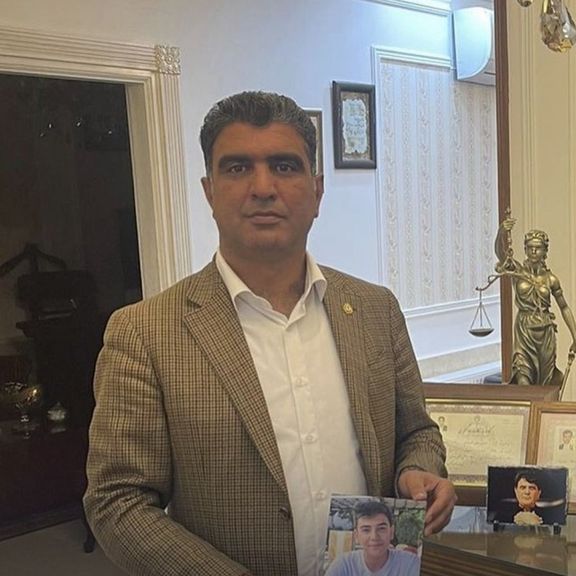
Khosrow Alikordi, an Iranian lawyer known for advocating in the cases of protesters' families, has been transferred to Vakilabad Prison to begin a one-year sentence.

Khosrow Alikordi, an Iranian lawyer known for advocating in the cases of protesters' families, has been transferred to Vakilabad Prison to begin a one-year sentence.
Upon completion, he faces a two-year ban from legal practice.
A day before his imprisonment, Alikordi addressed Iran's Supreme Leader, Ali Khamenei, in a video message, accusing the regime of hypocrisy. "The Islamic Republic celebrates its revolution anniversary with freedom as a core slogan. Yet now you are the jailer," he said.
In January, the judiciary accused Alikordi of engaging in "propaganda against the Islamic Republic system and in favor of groups opposing the regime."
The court referred to Alikordi's engagements with both national and international media, along with his online activities and writing as evidence of "propaganda against the system."
Alikordi's harassment began when he represented families affected by the 2022 uprising.
The Iranian government has a history of targeting and detaining lawyers, civil activists, and political dissenters. The crackdown has escalated since the nationwide protests against the Islamic Republic in September 2022.
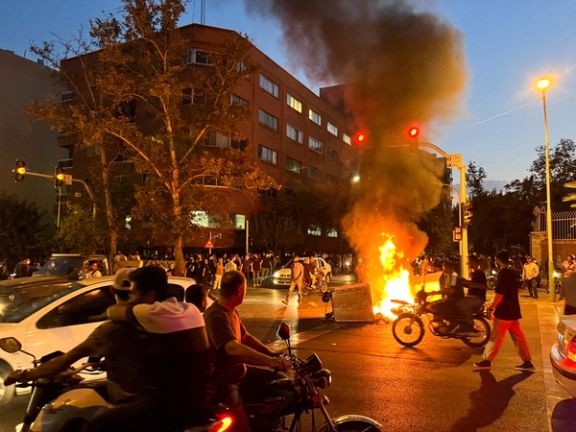
While Iran suffers its worst social and economic unrest since the 1979 revolution, the Kayhan daily, linked to Iran's Supreme Leader, claimed Iran would resemble present-day Saudi Arabia under the Pahlavi monarchy rule.
"Those rejected by the people [the Pahlavi royals] claim that if the Pahlavi government had remained, Iran would have moved towards progress and development, but in the most optimistic scenario, we would have the situation of today's Saudi Arabia," wrote Kayhan.
However, Iranians have led the biggest uprising against the government since the founding of the Islamic Republic since the 2022 Women, Life, Freedom movement, which has been met with brutal suppression by the regime.
Surging executions have seen hundreds of dissidents killed and hundreds of peaceful protesters murdered as the regime struggles to quash dissent and discontent. In the upcoming elections, turnout is expected to reach less than 15 percent.
However, the bizarre comparisons with Saudi Arabia, which last year resumed diplomatic ties with Iran, could only be wished for by the regime which is crippled under international sanctions for its nuclear program, suppression of unrest and most recently, its support of Russia's war on Ukraine.
Over the past two decades, Saudi Arabia's GDP has surged from $200 billion to over $800 billion, fueled largely by robust oil revenues and strategic economic diversification efforts. The kingdom, with its vast petroleum reserves, remains a dominant force in global oil markets and actively pursues initiatives to expand its non-oil sectors and foster employment among its nationals.
Despite possessing considerable oil and gas resources, Iran's GDP has dwindled to under $250 billion, experiencing a significant decline from $480 billion in 2016. Iraq, despite internal challenges, has surpassed Iran's GDP, while even non-oil producing Turkey boasts a GDP surpassing Iran's by over $800 billion.
Iran's economy, characterized by statist policies, faces systemic inefficiencies and a lack of private-sector-led growth. In contrast, Saudi Arabia's concerted efforts towards economic diversification and investment in sectors beyond oil underscore a divergent trajectory from Iran's economic struggles.
The kingdom's strategic initiatives to bolster education, job training, and attract foreign investment stand in stark contrast to Iran's economic challenges, marked by inflation, unemployment, and a persistent brain drain.
A 2022 survey by Netherlands-based Gamaan institute found that 41 percent of respondents wanted the overthrow of the Islamic Republic, exiled prince Reza Pahlavi the most popular alternative to take over.
In contrast to the Kayhan commentary, the royal family is still viewed with fondness. Mohammad Reza Pahlavi, overthrown by the Islamic Revolution of 1979, was viewed positively by 64% of respondents.
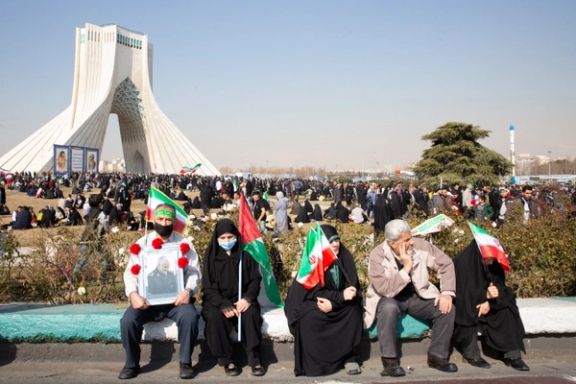
Anniversary rallies for the birth of the Islamic Republic fell flat as Iranians rejected the celebrations amidst ongoing suppression and economic depression.
Images and videos circulated on the main day of celebrations marking the 45th anniversary of the 1979 revolution depicted a stark contrast from previous years, with no apparent presence of people to fill the streets.
In a bid to conceal the failure, Supreme Leader Ali Khamenei said, "People across the country made efforts and showed their enthusiasm and fervor. This year, the people displayed revolutionary pride to the world."
The ten-day period from February 1 commemorates Ayatollah Ruhollah Khomeini's arrival in Tehran from Paris in 1979, culminating in the revolution's victory on February 11th.
People shunned the rallies despite efforts by the government included relaxing enforcement of compulsory hijab, one of the pillars of the 2022 Women, Life, Freedom uprising, and providing recreational activities on the streets. Crowds were sparse and venues largely empty.
Nonetheless, government-controlled media and officials hailed the celebration of the revolution as "epic".
Meanwhile, Iranians in many European and North American cities took to the streets to protest against human rights abuses in Iran as the regime continues its crackdown and accelerates execution of dissidents.
The efforts to portray a veneer of national unity come on the eve of the upcoming elections where voter turnout is expected to be below 15 percent, the country's apathy at an all time low amidst social and economic turmoil.
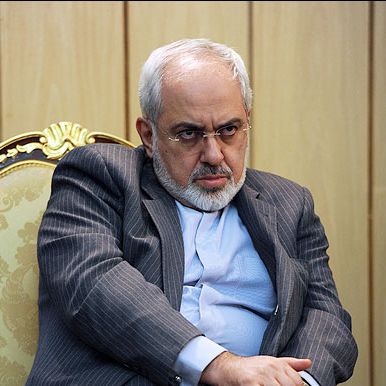
Referring to Iran’s protest movement in 2022, former foreign minister Mohammad Javad Zarif has said those involved thought the Islamic Republic would fall with a few slogans.
Addressing a meeting called “The New Order of the World” in the capital city Tehran, he accused the demonstrators of “wishing too much,” adding that it is a general characteristic of Iranian society.
Iran witnessed massive protests after Mahsa Amini, a 22-year-old woman, was killed in September 2022 while she was in morality police's custody. According to reports, more than 500 demonstrators were killed by regime’s security forces in a few weeks.
Zarif also discussed the increasing wave of emigration from Iran, saying many are idealistically after finding a paradise in foreign countries.
“They do not know that they and their spouses have to work day and night so that they might be able to purchase a 60-meter house in installments,” he claimed.
Zarif’s remarks come against the backdrop of what some experts call Iran’s “emigration crisis.” Earlier in the month, Secretary-general of the Iranian Medical Society Mohammad-Reza Zafarqandi warned about emigration of elite workforce and professionals from various medical and non-medical sectors amid economic crisis, noting that vital signs pointing to an emigration crisis have reached a critical level.
Over the past weeks, Zarif has tried to espouse positions close to those of the establishment in Iran in an attempt not to fade away from the country’s political stage, according to observers.
Last week, he claimed the popularity of Iran's Palestinian proxy, Hamas, has “greatly increased” in the wake of the atrocities of October 7. In January, Zarif also voiced support for Iran’s regional proxy groups, dubbed the “Axis of Resistance.”
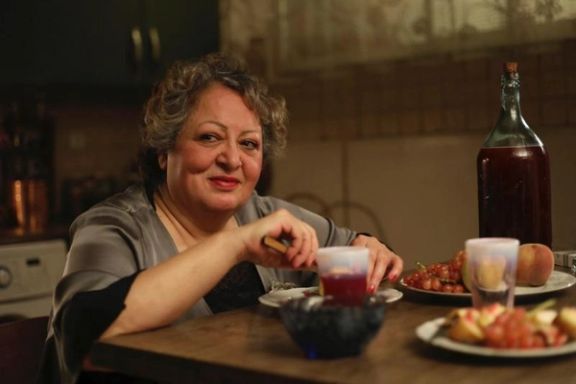
The non-conformist Iranian film “My Favorite Cake” was premiered on Friday at the 74th Berlin International Film Festival (Berlinale), where it received a 7-minute standing ovation.
Behtash Sanaeeha and Maryam Moqadam, the co-directors of the film, dedicated “My Favorite Cake” to “the dignified and free women of Iran.”
Produced secretly over the past two years in Tehran, the film has defied the Iranian regime’s draconian censorship rules and regulations by depicting women without compulsory hijab.
It represents normal lives of Iranians without government censorship, including such long-held cinematic taboos as men and women shaking hands, touching, hugging and drinking wine.
On Friday, the second day of the Berlin Film Festival, the press conference for "My Favorite Cake" was held without the attendance of the co-directors, who have been barred from leaving the country by the Islamic Republic. According to reports, the conference proceeded with photos of the two filmmakers on their empty seats as a gesture of commemoration.
During the press conference, Leili Farhadpour, one of the actors of the film, read Sanaeeha and Moqadam’s statement in their absence.
“We have come to believe that it is no longer possible to narrate the story of Iranian women by conforming to such strict rules as compulsory hijab,” the statement said, further adding that the red lines have for long precluded “the representation of the real lives of Iranian women as complete human beings.”
They added that Iranian filmmakers have been for many years facing stringent rules and red lines, the rejection of which can lead to arrests, long professional bans and complicated legal procedures.
In order to show one aspect of the reality of Iranian society which has been “lost in different layers of censorship” for years, we decided to cross all these red lines and we accept the consequences of our decisions, Sanaeeha and Moqadam stressed.
“My Favorite Cake” portrays the everyday lives of middle-aged women in contemporary Iran, with a special focus on the loneliness of a woman on the verge of old age.
The protagonist of the film is a 70-year-old woman, a role played by Leili Farhadpour, who experiences a new love following her husband’s death.
It has been a taboo for the Iranian cinema to show old women fall in love again, Farhadpour said during the film’s press conference in Berlin.
Referring to the regime’s strongly-policed red line to depict women always with hijab in Iranian films, even in their homes or while taking a shower, Farhadpour tauntingly added: “Women do not wear hijab when they sleep and the audience laughs when they [female actors] go to bed wearing a hijab in movies,” that are forced to implement censorship rules.
According to her, it was in the middle of filming “My Favorite Cake” that the Woman, Life, Freedom movement started in Iran in 2022.
“From the very beginning, the work was to be made in this way without women having to wear hijab,” she stressed.
Four months ago, Iranian security forces stormed the house of the film’s editor and confiscated all the computer and electronic archives of the film.
On September 30, the police forces seized the passports of Sanaeeha and Moqadam when the couple wanted to travel to France to continue to work on the completion of “My Favorite Cake.” Since then, a legal case has been filed against them.
Earlier in the month, Berlinale directors Carlo Chatrian und Mariëtte Rissenbeek called on the Islamic Republic of Iran to allow the two filmmakers to leave the country and attend the festival.
“The Berlinale is a festival fundamentally committed to freedom of speech, freedom of expression and freedom of the arts … and the festival is shocked and dismayed to learn that Moghaddam and Sanaeeha could be prevented from traveling to the festival to present their film and meet their audience in Berlin,” said Chatrian and Rissenbeek in a joint statement.
“We call for the Iranian authorities to return the passports and to end all restrictions” for the filmmakers, the statement went on to say.
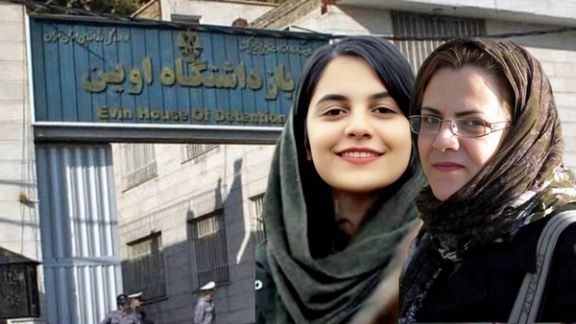
Marzieh Farsi and Forough Taghipour, two female Iranian political detainees held in Evin Prison, have been handed down 15-year prison sentences each by the Tehran Revolutionary Court.
According to reports from the US-based Human Rights Activists News Agency (HRANA), Farsi and Taghipour, previously charged with "armed rebellion," were convicted for alleged affiliation with anti-government groups in a joint case.
Their trial was conducted without their presence in court, as they refused to recognize the court's legitimacy and opted out of attending the session.
The two women were arrested on August 21 in Tehran, both having a history of detention and imprisonment for their activism.
HRANA underscored that Farsi is battling cancer and is in poor physical health.
In addition, Parvin Mir-Asan, a 66-year-old political detainee involved in the 2022 protests, remains incarcerated in Evin Prison for 15 months and 15 days without a trial and an end in sight. Informed sources reveal Mir-Asan's health issues, including diabetes, Parkinson's disease, joint problems, and neurological disorders, exacerbated by the lack of proper medical care.
The Islamic Republic has persistently detained, tortured, and imprisoned civil and political dissidents since its establishment.
The nationwide uprising against the Islamic Republic since September 2022 has witnessed escalated government repression against civil, political activists, and protesters, continuing unabated.